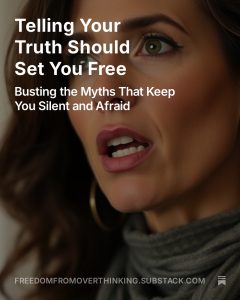How to open the door to what you really want
Women have a complicated relationship with the word and feeling of “want.” For so many women, it’s hard to allow “wanting” a seat at our inner table. We replace “want” with “should”—do what we think we should do, become who we think we should be. And we’re very good at doing what we “should” do, but over time, we lose touch with the feeling of wanting altogether. So many women haven’t asked themselves what they “want” for so long that the question itself feels strange, blank, and unanswerable.
At the same time, we’re conditioned to believe that allowing ourselves to “want” is selfish and indulgent. Who are you to get to do what you want? is a common sentiment, as if wanting itself is an act of entitlement. Because you “want” something is not a good enough reason to act on it; we need some extra validation or legitimization to get to consider our own wants, if they still exist at all.
“Wanting” in our culture has also been linked with sloth, immaturity, and even danger. The message we receive from a very early age is that if we allow ourselves to “want,” we will end up on the couch, naked and eating bonbons for the rest of time. “Wanting” is presented to us as a process dictated by our fundamentally sinful nature. “Wanting” is linked with the body and its dangerous desires, while “shoulding” is tied to the mind, productivity, and the rational. The “should police” make sure we stay in line and offer all sorts of narratives for what will happen to us and who we could become if we were to trust our “want.” Essentially, we would be playing with fire and tempting fate. On the other hand, when we act from a sense of duty—doing what we “should” do, what’s “right” and “expected” (not just what we “want”), we’re being virtuous and mature, taking the higher road, and doing good. In a nutshell, “want,” as it’s presented in our cultural narrative, is bad, while “should” is good—and makes us a good person.
“Want” is a feeling that comes with a lot of baggage in our culture. But there’s another aspect of our strange and strained relationship with “wanting” that further complicates our ability to connect to what is, in fact, our most primal, authentic, and life-directing sentiment—our deepest wisdom.
The challenge is that we think of “wanting” in terms of what we want. We go looking in our mind for a possible object of our “wanting”—a car, a house, a particular job, a certain amount of money, or some other such external thing or accomplishment. The focus is often on the thing itself that we think will make us happy. And yet, if we want to genuinely restore our connection and open the doorway to our own “wanting,” if we want to tether ourselves back to our authentic self and remember what makes us who we are at center, if we want to consult the wise guide within us, we need to ask ourselves different questions when it comes to our relationship with “want.”
Instead of asking yourself What do I want? try asking yourself What delights me? Or, What wags my tail? Perhaps the question is What would make today a good day? What makes a day feel nourishing and joyful—for me? What kind of day inspires gratitude? And, at the core, What do I like without having to try to like it?
These sorts of questions take the focus off the external object of “wanting” and place it on your individual and unique experience. They shift you from a future orientation, something you’re going to get that’s not here now, to a right-now-centered experience inside you. They turn your focus from outside to inside—move you from an idea of what you want that lives in your head to the direct experience of delight that lives in your body. Quite literally, the feeling of a dog who’s wagging its tail.
If you ask a kindergartner whether she likes a particular person, the answer is straightforward and obvious: She likes him or she doesn’t; she wants him at her birthday party or she doesn’t. Liking is not complicated, nor is the feeling it inspires inside us. In fact, it’s one of the best feelings we get to have as humans. Such simple inquiries and yet so powerful: what do I like to do, who do I like to be with, how do I like to spend a day?
When you start asking yourself these, to some degree, simpler questions, you move out of your head and into your heart and body. If what you want feels mysterious or unreachable, try using different language. Rather than focusing on what you want, instead of combing through possibilities of things and experiences that you could want in your mind, try dropping into your body and marinating in what delights you or what makes your tail wag. Be a kindergartner.
Give it a whirl. If the “wanting” in you remains elusive, don’t despair; walk with and live in these simpler questions. Notice when you feel delight or liking or just plain good. You are probably meeting a voice inside you that hasn’t been consulted or invited into the conversation for a long time. And if nothing changes and you still don’t sense who you want at your birthday party, rest assured, the “should police” will welcome you back with open arms. But my (confident) hunch assures me that that won’t happen.


